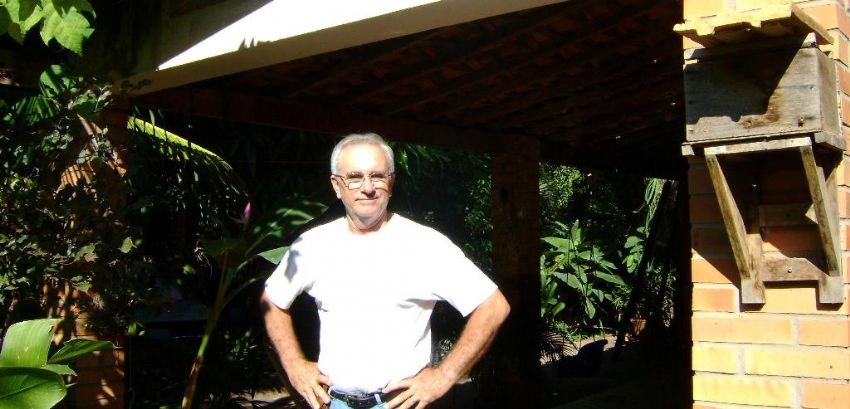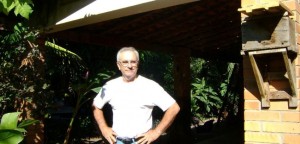
Beekeeper Cacerense celebrates national seal for honey produced in the Pantanal
Newspaper West, Published 14/03/15.
 The Pantanal is now officially recognized region as honey production. The Geographical Indication seal (IG) in the form Indication of Origin (IP), awarded by the National Institute of Industrial Property (INPI), on Tuesday (10), through publication in the Official Gazette of the body, defines the largest floodplain in the world as a region with a tradition in honey production. This is an old demand of the Pantanal Beekeepers of Mato Grosso and Mato Grosso do Sul.
The Pantanal is now officially recognized region as honey production. The Geographical Indication seal (IG) in the form Indication of Origin (IP), awarded by the National Institute of Industrial Property (INPI), on Tuesday (10), through publication in the Official Gazette of the body, defines the largest floodplain in the world as a region with a tradition in honey production. This is an old demand of the Pantanal Beekeepers of Mato Grosso and Mato Grosso do Sul.
The Cooperative Council, associations, Warehouses and related companies to Beekeeping in the Pantanal of Brazil (Confenal), Applicant's registration, acquired the exclusive right to authorize the use of the seal. This entity will control its application in products. Sebrae MT supported the segment, the organization of Mato Grosso associations and the process with the INPI.
new stimulus
“The Geographical Indication seal Mel Pantanal was awaited for a long time”, Felix celebrates Antenor Labaig (photo), retired biologist, there beekeeper 40 Caceres years and president of the Upper Paraguay Beekeepers Association (Apialpa). It was about five years, between meetings, organizing associations, the application and registration. From now on, consumers are guaranteed to be buying honey Pantanal, Felix highlights.
“The Pantanal is the absence of monoculture. Until now, It is a preserved region. The Pantanal flora generates Honey differential region. There are nectars, here only occur”, justified.
Everson Aquinas Nunes, Beekeeper Poconé there 10 years and current president of the Beekeepers Association and Honey Producers Pantanal Organic (Apiopan) He was pleased with the news. “Long time we were struggling to get this recognition. The activity weakened walks in our region, but now I believe it will encourage beekeepers to return to produce more”, he added.
Poconé has come to produce 18 ton / ano. Last year, were 11 your, reports. The product is marketed in the region. A honey house is being structured by Apiopan have been installed and the area of extraction and dressing room. The seal will stimulate the body to continue enhancing honey house and will return associated, provides Everson.
“This seal comes at a good time, as the activity goes through weakened. Will open the market for us, I believe to export. It will improve the organization and awareness of beekeepers”, says José Catarino Mendes, there beekeeper 25 years of Our Lady of Deliverance and responsible for the brand Biomendes.
He has a hundred hives and also has a store in Várzea Grande. Catarino points out that the Pantanal is a biome still a virgin, without problems of contamination by pesticides and insecticides, very common in fruit growing regions or monocultures.
You Floradas
The taste and aroma of the product reflects the biome's biodiversity. The beekeeper explained that the Pantanal blossoms are unique and let you collect different types of honey, each season of the year. Honey Cambard, for example, It takes place in July and August; aquatic herbs such as water hyacinth, in March and April; of pepper, between December and January; and mint, in May.
There are plant species in the region Pantanal that are excellent pollen-generating, as Canjiqueira and Mumps, occurring in the ebb. “The Canjiqueira is optimal for the production of royal jelly. The Canjiqueira honey is very tasty. She is beautiful and the bees love”, Catarino reports. In the months of July and August, there are creepers and vines that also favor the production of nectar and honey differentiated, complements.
Search
Carla Galbiati, doctorate in entomology at the University of the State of Mato Grosso (Unemat) /Campus de Cáceres and professor of agronomy course, research for more than ten years honey and propolis the Pantanal, Amazon and Araguaia. The studies are aimed at proving the physical and chemical quality of products (do not include nutritional and therapeutic properties).
“This achievement is important for beekeepers. I have followed the IG process. This seal is a breakthrough, it protects and guarantees the production of the biome”, explica to Galbiati. The Brazil will be interested in the Pantanal Honey, she said. Consequently management is also improved. Beekeepers Pantanal biome will seek to improve the quality to supply the product throughout the country, predicts Dr..
Source: Newspaper published in West 14/03/2015 http://www.jornaloeste.com.br/noticias/exibir.asp?id=33680¬icia=apicultor_cacerense_comemora_selo_nacional_para_o_mel_produzido_no_pantanal

Sorry, the comment form is closed at this time.